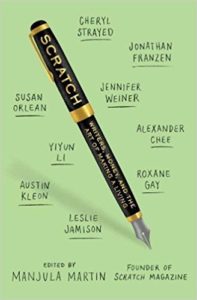I am a big fan of books about writing. Sometimes these books can be fascinating, while other times they verge on dull. Scratch: Writers, Money, and the Art of Making a Living falls under the former category. Edited by Manjula Martin, this book is a collection of essays and Q&As with writers about the finances of our favorite craft – something that, until now, hasn’t much been discussed amongst the literary world.
Here are the five biggest takeaways I gleaned from Scratch:
1) Day jobs aren’t bad
Writers dream of the day they can hang up their work clothes and exist solely to write. But the slight issue (if there is an issue sustaining yourself as a writer) is that it can mean that you write to exist. I, too, would love little more than becoming an acclaimed novelist and have the pleasure of writing 9-5, but when your writing has to support you, it can take the magic out of the craft. Author Malinda Lo says that she considers writing an art instead of a means to pay the rent, and that freedom has turned her world upside down (page 220). When the pressure is off – when you’re not racing deadlines or trying to best your other work – creativity seems to be an untapped fountain. If you have a day job, embrace it, because that means you aren’t writing to exist.
2) It’s okay to write for free
N either Manjula Martin nor the contributors to Scratch would suggest always writing for free, but there can be benefits to it. The best way to get better as a writer is to write, and changing up your writing style in order to fit new formats and target different audiences is good practice that can only contribute to your betterment. Writer Nina MacLaughlin, when talking about writing a book review for free, likens it to keeping her writing muscles flexed (page 10). Being published exposes you to more readers as well, and isn’t that every writer’s goal – paid or not?
either Manjula Martin nor the contributors to Scratch would suggest always writing for free, but there can be benefits to it. The best way to get better as a writer is to write, and changing up your writing style in order to fit new formats and target different audiences is good practice that can only contribute to your betterment. Writer Nina MacLaughlin, when talking about writing a book review for free, likens it to keeping her writing muscles flexed (page 10). Being published exposes you to more readers as well, and isn’t that every writer’s goal – paid or not?
3) You don’t need an MFA to be a successful writer
I oftentimes fantasize about going to Iowa Writer’s Workshop or another esteemed school to obtain my MFA in creative writing. It sounds like a dream – you write, spend time with writers, learn about writing and go to readings. The supported environment is likely unparalleled. But the truth is, you can write, spend time with writers, learn about writing and go to readings whether you are enrolled in an MFA program or not. It simply boils down to your dedication to the craft. J.K. Rowling, Jonathan Franzen and John Grisham have all met a lot of acclaim, and not one of them have the letters MFA behind their name. Don’t be discouraged if you haven’t obtained your MFA. If you really want to be a writer, you will find a way, formal education nor not.
4) Be Prepared to Promote
A lot more goes into publishing a book than writing a manuscript, and several essays in Scratch put that into perspective for me. When you publish a book, you make an agreement with a publishing house to get out and promote it, which can include readings, interviews and appearances, just to name a few. Even if you have the ability to quit your job and devote yourself to writing full-time, you will still do a lot of work that isn’t writing. I think this is important to keep in mind when dreaming of becoming a full-time writer.
5) It’s all for the love
The most common theme throughout this book is that writers do it for the love of the craft. Chances are, if you’re reading this, that love runs deep within you as well. Writers face rejection and spend a lot of time working alone, but the rewards of eventually getting our stories out far outweigh the difficulties that we can face.
The reason I liked Scratch so much is because, though the opinions and tones differ from writer to writer, the book is honest. Writing has its ups and downs, but we do it because we love it and because there is nothing we’d rather be doing. Hearing these stories enlightened me to what it’s really like to be on the New York Times Bestseller List, showed me that even the most successful writers have their doubts, and assured me that I am on the right track, even though I haven’t yet been published in the Paris Review. If you are a writer or want to become one, I highly recommend this read.
 Kolina Cicero is a writer in Minneapolis. She writes fiction and essays, and is currently working on a collection of short stories. Kolina can be found on Twitter at @KolinaCicero.
Kolina Cicero is a writer in Minneapolis. She writes fiction and essays, and is currently working on a collection of short stories. Kolina can be found on Twitter at @KolinaCicero.







